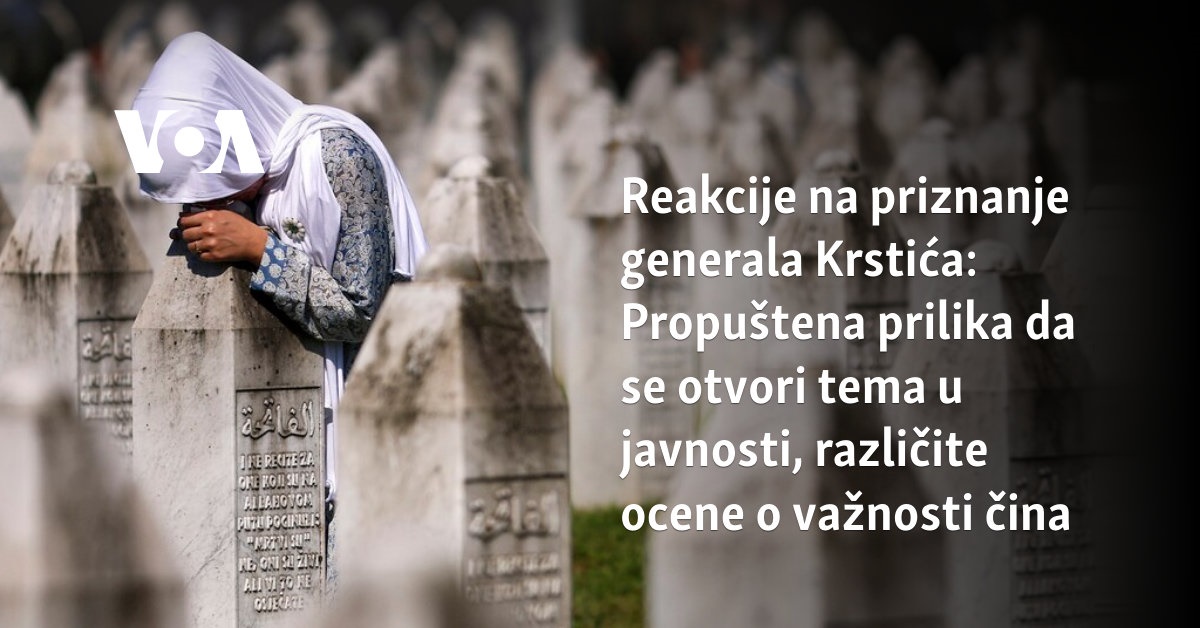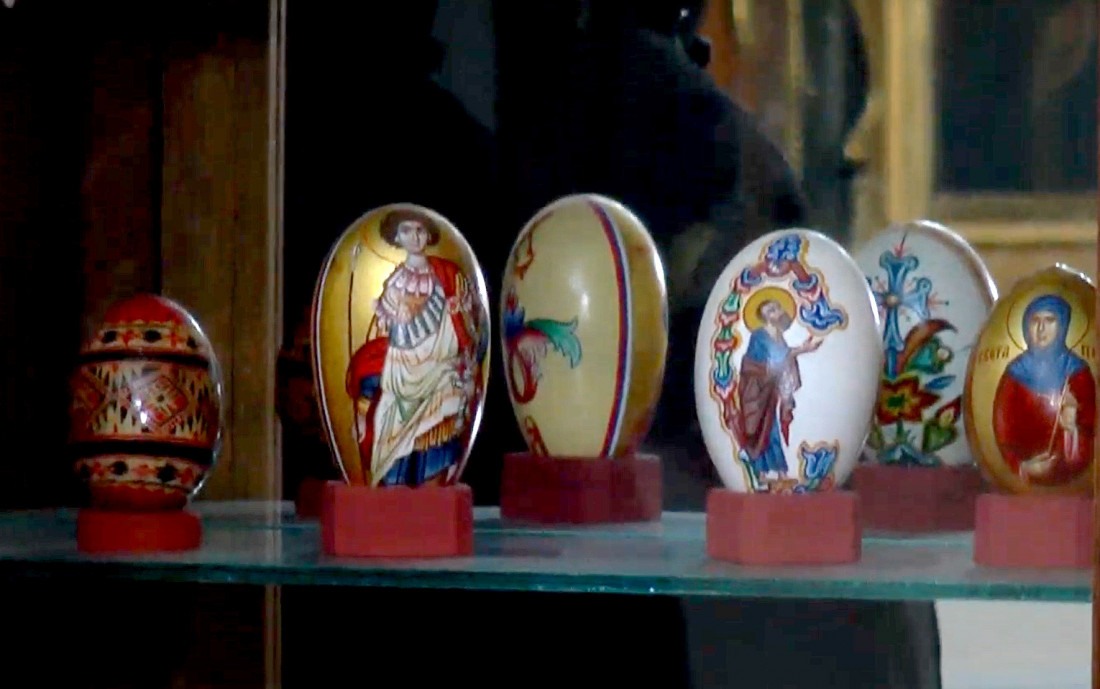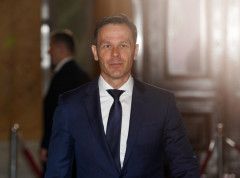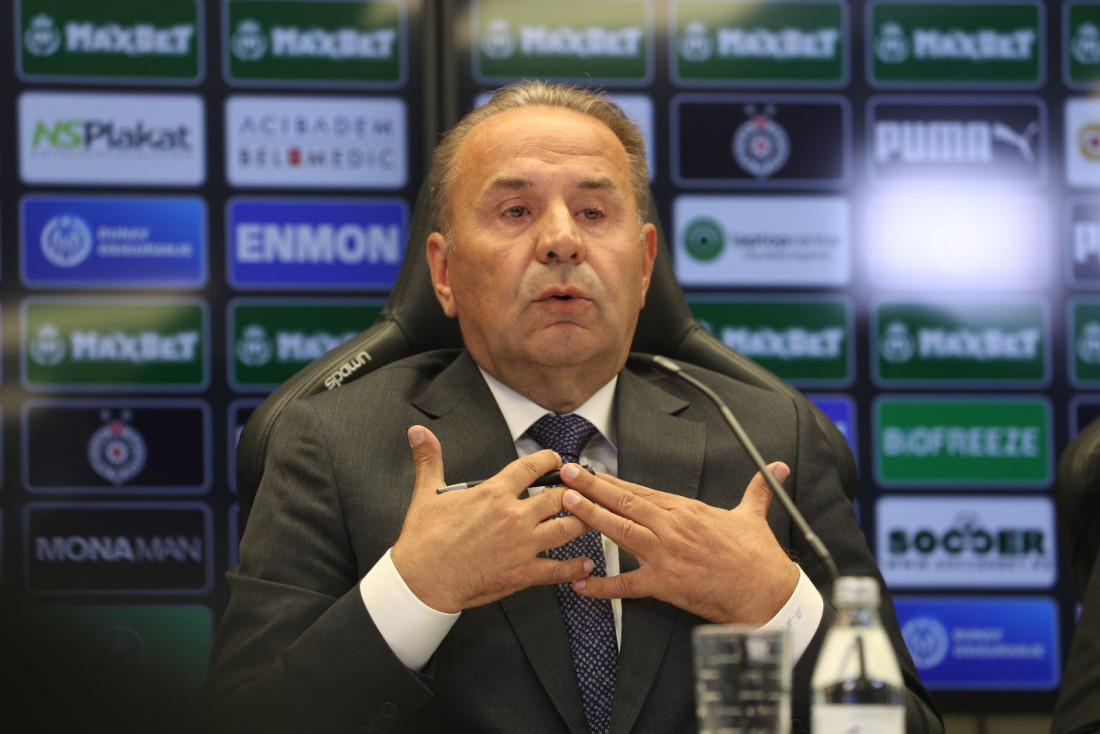General Radislav Krstić, commander of the Drina Corps of the Army of Republika Srpska, the first convict of the Hague Tribunal to be convicted of genocide in Srebrenica, stirred public opinion in the region by publishing his letter from May of this year in which he admits guilt for genocide, supports the resolution adopted by the United Nations, expresses regret and a desire to go to Potocari and pay his respects to the victims.
While the public is mostly debating whether Krstić’s address is sincere, as it was published as part of his request for early release, interlocutors of Voice of America assess the significance of this act differently and predict that the event will turn into another missed opportunity for changing public attitudes in Serbia and Republika Srpska towards the worst crimes of the 1990s wars.
Sofija Todorović, director of the Youth Initiative for Human Rights in Serbia (YIHR), believes that the case of Krstić’s letter will be another missed opportunity to discuss the crimes „committed in our name“.
„In one part of the public, there is a lack of understanding that admitting guilt does not change the judgment itself. The judgment is what it is, this is one of the first judgments handed down for genocide in Srebrenica, this man was ultimately sentenced to 35 years in prison for some of the worst crimes under international criminal law. This admission does not change that,“ explains Todorović for Voice of America.
Where the admission could have an important impact, she continues, is changing the way political actors in Serbia and Republika Srpska talk about the genocide in Srebrenica, but that is not happening.
„To us, the Resolution on Srebrenica (at the UN) was a central part of the campaign for the Belgrade elections and the terrible abuse of that document, spreading falsehoods about what it means and what its consequences will be, including huge falsehoods about what it says. The public was terribly misled on that occasion. Denial is used as a political strategy and I think that’s where the importance of this admission lies and what is said in it – this text is important in the context of countering that narrative,“ Todorović adds.
The importance of admission
Nataša Kandić, founder of the Humanitarian Law Fund, believes that it is not important whether Krstić’s statement is sincere, but that it is much more important that „someone who was the commander of the Drina Corps, who participated in the commission of genocide, admitted it, very detailed, very reasoned“.
„This is important not only for Serbia, but also for the victims. Regardless of the fact that many years have passed since the indictment and trial of Krstić, the moment has come for him to say it. He did not change his views for years, he did not acknowledge that genocide, even though he applied for early release, but now he writes a letter so that it is accessible to the public,“ says Kandić.
Kandić also assesses that his letter has provoked contempt „both from the authorities and from the majority of opposition political parties“:
„The public is completely indifferent, the media are completely indifferent, I would say it can be easily interpreted as contempt, silence and ignoring what he said in the letter… This is all indicative of a very bad state in Serbia, that the authorities very clearly ignore and despise this, that he betrayed that ‘Serbian world’, that he betrayed the narrative about Srebrenica…“.
„The government is silently slandering him, for the government he does not exist, admitting genocide does not exist and everyone has the task of actually keeping silent about this admission,“ says Kandić.
Todorović says: „It is better to have admission than not to have it. This is an incredibly important thing for me and I think it is particularly important in this political moment in Serbia where denying and denying genocide are no longer incidents, but have become the rule and an integral part of state policy. We can see that in educational policies and textbooks of events from the 1990s. That is why it is important to interpret this case in the current context, emphasizing that this in no way diminishes the responsibility of Radislav Krstić“.
Žarko Korać, a psychology professor and former anti-war politician, however, believes that such a belated admission is not too important:
„Historically, the judgment remains, his name remains, and I am completely irrelevant what he said now, because moral norms are there to prevent you from doing something, not when a horrific crime happens, to later regret it. That remains to religions, beliefs, because religion thinks there is another judge, another judge who will bring the right judgment after death. For those who are not believers, only earthly judgment remains. I don’t care what he thinks about it, he should have thought before all those crimes were committed“.
„It remains to be seen how his comrades, people who are some convicted, the largest number who are unconvicted – he was certainly not alone, that Drina Corps was not alone. The judgment has been handed down, it is clear, he has been sentenced to the highest penalty that the Hague Tribunal can impose,“ says Korać.
Semir Mujkić, editor-in-chief of the Bosnian BIRN, states that Krstić’s admission is very significant: „There is a general distrust of how sincere it is, but despite that, there is an understanding of how important this is and how rare it is. Such a move is extremely rare in both Serbia and BiH. Very few people were willing to say something like that. This is generally lacking for a kind of catharsis – both in BiH and especially in Serbia.“
„I would say that even with that victim’s distrust – who publicly spoke out and said they would not have trust until they see that he will continue to adhere to it when he eventually is released – this is significant for BH society,“ says Mujkić for Voice of America.
Reactions in BiH and the factor of Biljana Plavšić
Sofija Todorović also recalls that witnesses and victims during the process said that in addition to the judgments, it would mean something to them if the perpetrators had a different attitude towards the committed act, that they themselves admitted guilt.
Mujkić says that in BiH, „as with everything,“ Krstić’s admission is seen from multiple angles and perspectives.
There is very clear ignorance in the media and public of Republika Srpska, or perhaps the opinion that it was done only to obtain early release and a little more freedom, and that it is not completely sincere, because there is a very clear, even institutional denial of genocide in RS, says Mujkić.
„In the Federation, among the Bosniaks who were victims of that genocide, there is great skepticism, for which Biljana Plavšić (the wartime president of Republika Srpska) is mostly responsible, who, in prison, did something similar, but then when she was released from prison, completely changed the story and did not stick to what she said in court.
Korać also mentions the factor of Biljana Plavšić: „She (Biljana Plavšić) herself said she lied, that she was insincere, she said she did not regret at all. The assessment of someone who has been convicted to repent – and General Krstić went much further, he admitted that it was genocide, that he would have labeled it outside the court – that remains for each individual to believe or not believe, it is very individual because we do not know what he sincerely thinks,“ explains Korać.
About a possible visit of Krstić to the crime scene
Todorović reminds that this Krstić’s request is not the first request for early release, but the third, and that the previous two were rejected.
However, she reminds that in Serbia there is a „glorification of war criminals who are introduced into political life“ and that through this action they „deny the facts established in their judgments“.
„That is why I think that any early release would be a wrong decision,“ says Todorović and points out that many other convicted war criminals have come to Serbia, that their judgments have been relativized in Serbia. „I don’t think something like that should happen.“
Radislav Krstić expressed in his letter a desire to, if released and if the families of the victims allow it, visit Potocari and pay his respects to the victims of the genocide.
Mujkić says he is not sure what the reaction of the families of the victims would be if Krstić were to be released and asked for such a thing. He says it would probably first be met with rejection, as President of RS Milorad Dodik was rejected for statements he made, „but in time people would realize how ‘strong’ that would be.“
„There is no person who would not have an emotion when they saw him in Potocari, in front of all those names. I think that would be something that could not be ignored,“ as Krstić’s letter is currently being ignored.
However, there is a very high risk that it could turn into something completely opposite, such as the visit of Aleksandar Vučić to Potocari, warns Mujkić.
Propuštena prilika da se otvori tema u javnosti, različite ocene o važnosti čina

Podeli vest



